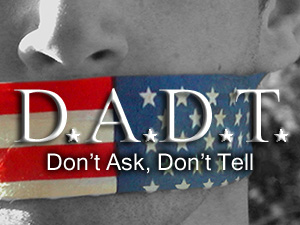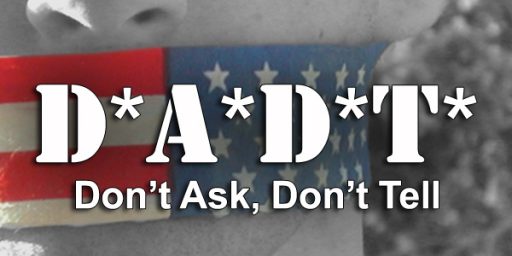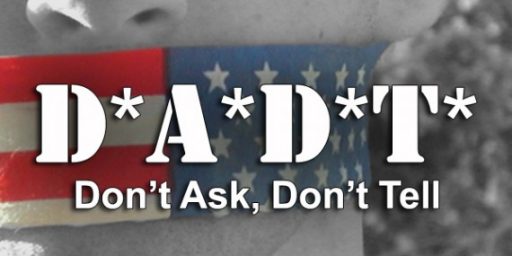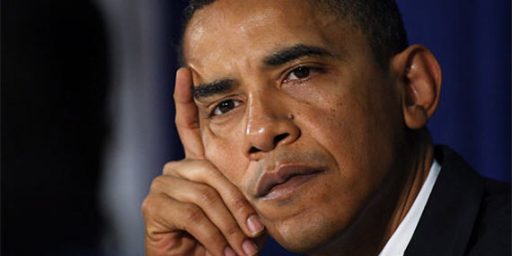Obama to End Don’t Ask, Don’t Tell
 The last Democratic president began his administration by starting the controversial “Don’t Ask, Don’t Tell” policy regarding gays in the military. His successor may start by ending it.
The last Democratic president began his administration by starting the controversial “Don’t Ask, Don’t Tell” policy regarding gays in the military. His successor may start by ending it.
President-elect Barack Obama will allow gays to serve openly in the military by overturning the controversial “don’t ask, don’t tell” policy that marred President Clinton’s first days in office, according to incoming White House Press Secretary Robert Gibbs.
The startling pronouncement, which could re-open a dormant battle in the culture wars and distract from other elements of Obama’s agenda, came during a Gibbs exchange with members of the public who sent in questions that were answered on YouTube. “Thadeus of Lansing, Mich., asks, ‘Is the new administration going to get rid of the “don’t ask, don’t tell policy?'” said Gibbs, looking into the camera. “Thadeus, you don’t hear a politician give a one-word answer much. But it’s, ‘Yes.'”
The Obama transition team declined to elaborate on that one-word answer when asked by FOX News on Wednesday about a timetable for repealing the policy, which was enacted by Clinton after a protracted public debate. Obama officials also would not explain which lawmakers or Pentagon officials would attempt to repeal “don’t ask, don’t tell.”
Clinton, who initially sought to overturn the longstanding ban on gays in the military, ended up enacting the “don’t ask, don’t tell” policy as a compromise that made it illegal for commanders to ask about the sexual orientation of service members, who were also barred from announcing they were homosexual. If a service member’s homosexuality becomes known anyway, he or she is expelled.
One of the great misconceptions about DADT is that people think it began the ban on gays in the military. In fact, it was an attempt to allow gays to serve if they kept their sexuality to themselves. Perversely, however, it led to a witch hunt mentality in which suspected gays had to be “caught” since they couldn’t be asked.
As I’ve noted here more than once over the years, one of the more bemusing experiences I had in the military was the questioning for my Top Secret/Sensitive Compartmented Information clearance as a cadet about to be commisioned as a military intelligence officer (albeit one detailed to the field artillery). This would have been late 1987 or early 1988, several years before DADT. There were a whole series of questions on homosexuality — Was I gay? Was I even a little bit gay? Had I ever thought about becoming gay? Could I envision myself turning gay? Was I sure? The rationale, apparently, was that, since gays were not allowed in the military and homosexual acts were subject to court martial, a closeted gay was subject to blackmail by the enemy.
While I believe that the cultural barriers that made the DADT compromise more palatable than removing the ban on gays still exist, they’re certainly lower than they were in 1993. The military is a microcosm of the larger society, whose values on the matter have changed considerably.
It’s worth noting, however, that the president can’t overturn the ban on gays in the military on his own. That’s contained in the Uniform Code of Military Justice, which is codified in federal law. Indeed, DADT itself is codified in Public Law No: 103-160. It will, quite literally, take an act of Congress to change.






“…Are ether of you homosexuals … just a standard question…”
“no … but we’re willing to learn”
Which perfectly high lights the stupidity that sometimes passes for “rational” thought on the part of people in government.
The way to solve the above problem was not to ask embarassing questions about a person’s sexuality, but to remove the ban gays serving in the military. In fact, encouraging soldiers, especially ones working with classified materials to come out of the closet would go even further to remove this kind of an issue.
I believe it was in Charles Stross’s Atrocity Archives where two of the supporting characters, who were gay and lovers, were mandated to go to the Gay Pride Parade as a job requirement so that they could retain their security clearances.
And then, given the times in which we live, there is this piece of absolute insanity:
Morons.
A NCO I had them in my platoons and companies. I never had any problems, but then I looked at it as “different strokes for different folks”.
I read a story not to long ago about a platoon with a gay medic. Everybody knew he was gay, they didn’t care. He would run through the fires of hell to get one of them out of trouble.
In the end I suspect, that is all any soldier, airman, sailor or marine really cares about.
Its pretty simple. If someone is ready to put their life on the line for their country, they should not have to live a lie to do so…